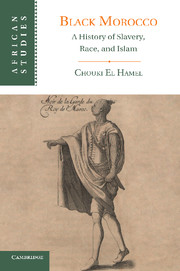Crossref Citations
This Book has been
cited by the following publications. This list is generated based on data provided by Crossref.
Freire, Francisco
2014.
Saharan migrant camel herders: Znāga social status and the global age.
The Journal of Modern African Studies,
Vol. 52,
Issue. 3,
p.
425.
COLLER, IAN
2015.
AFRICAN LIBERALISM IN THE AGE OF EMPIRE? HASSUNA D’GHIES AND LIBERAL CONSTITUTIONALISM IN NORTH AFRICA, 1822–1835.
Modern Intellectual History,
Vol. 12,
Issue. 3,
p.
529.
Gomez, Michael A.
2016.
Diasporas, Cultures of Mobilities, ‘Race’ 3.
p.
53.
2016.
Diasporas, Cultures of Mobilities, ‘Race’ 3.
p.
313.
Silverstein, Paul A.
2017.
Minority politics in the Mediterranean world.
History and Anthropology,
Vol. 28,
Issue. 5,
p.
653.
Ladjal, Tarek
and
Caruana, John
2017.
The Christian presence in North Africa under Almoravids Rule (1040–1147 CE): Coexistence or eradication?.
Cogent Arts & Humanities,
Vol. 4,
Issue. 1,
p.
1334374.
Soares, Marina de Oliveira
2017.
O harém ao rés do chão: imaginário europeu e representações médicas sobre o lugar-segredo, 1599-1791.
Bashir, Haroon
2019.
Black Excellence and the Curse of Ham: Debating Race and Slavery in the Islamic Tradition.
ReOrient,
Vol. 5,
Issue. 1,
Larisse, Agathe
2019.
Affiliation volontaire à l’islam et assignation raciale.
Archives de sciences sociales des religions,
p.
93.
Dakhlia, Jocelyne
2019.
Savants, amants, poètes et fous.
p.
293.
Tyszler, Elsa
2019.
From controlling mobilities to control over women’s bodies: gendered effects of EU border externalization in Morocco.
Comparative Migration Studies,
Vol. 7,
Issue. 1,
Katz, Steven T.
2019.
The Holocaust and New World Slavery.
Pierre, Jemima
2020.
Slavery, Anthropological Knowledge, and the Racialization of Africans.
Current Anthropology,
Vol. 61,
Issue. S22,
p.
S220.
Botte, Roger
2020.
Migrations forcées des africains subsahariens : Maghreb, Al-Andalus, péninsule Ibérique. Une synthèse.
Journal des Africanistes,
p.
6.
Østebø, Terje
2020.
Islam, Ethnicity, and Conflict in Ethiopia.
Tyszler, Elsa
2020.
Masculinités et féminités à la frontière maroco-espagnole. Miroirs d’un contrôle migratoire racialisé et genré.
Anthropologie & développement,
Vol. 51,
Issue. ,
p.
155.
El Miri, Mustapha
2020.
Devenir « noir » sur les routes migratoires.
Sociologie et sociétés,
Vol. 50,
Issue. 2,
p.
101.
Mateo Dieste, Josep Lluís
2021.
“La cocina de la esclava y la fama para su ama”. Intercambios rituales y paradojas de la esclavitud en Tetuán.
Disparidades. Revista de Antropología,
Vol. 76,
Issue. 1,
p.
e009.
Downing, John DH
and
Gamil, Abdulla Idris
2021.
Blackness in Arab transnational television comedy: Fresh pushback against entrenched stereotypes.
International Communication Gazette,
Vol. 83,
Issue. 3,
p.
260.
Francisco, Felipe Benjamin
2021.
The Southern Moroccan Dialects and the Hilāli Category.
Languages,
Vol. 6,
Issue. 4,
p.
192.



